Principles of Mental Health: Nursing Care for Altered Mental Status Patients
VerifiedAdded on 2023/05/30
|15
|3961
|448
AI Summary
This article discusses the principles of nursing care for patients with altered mental status. It covers topics such as fundamental freedoms and basic rights, protection of minors, determination of mental illness, confidentiality, role of community and culture, standards of care, treatment, medication, consent to treatment, notice of rights, and rights and conditions in mental health facilities.
Contribute Materials
Your contribution can guide someone’s learning journey. Share your
documents today.
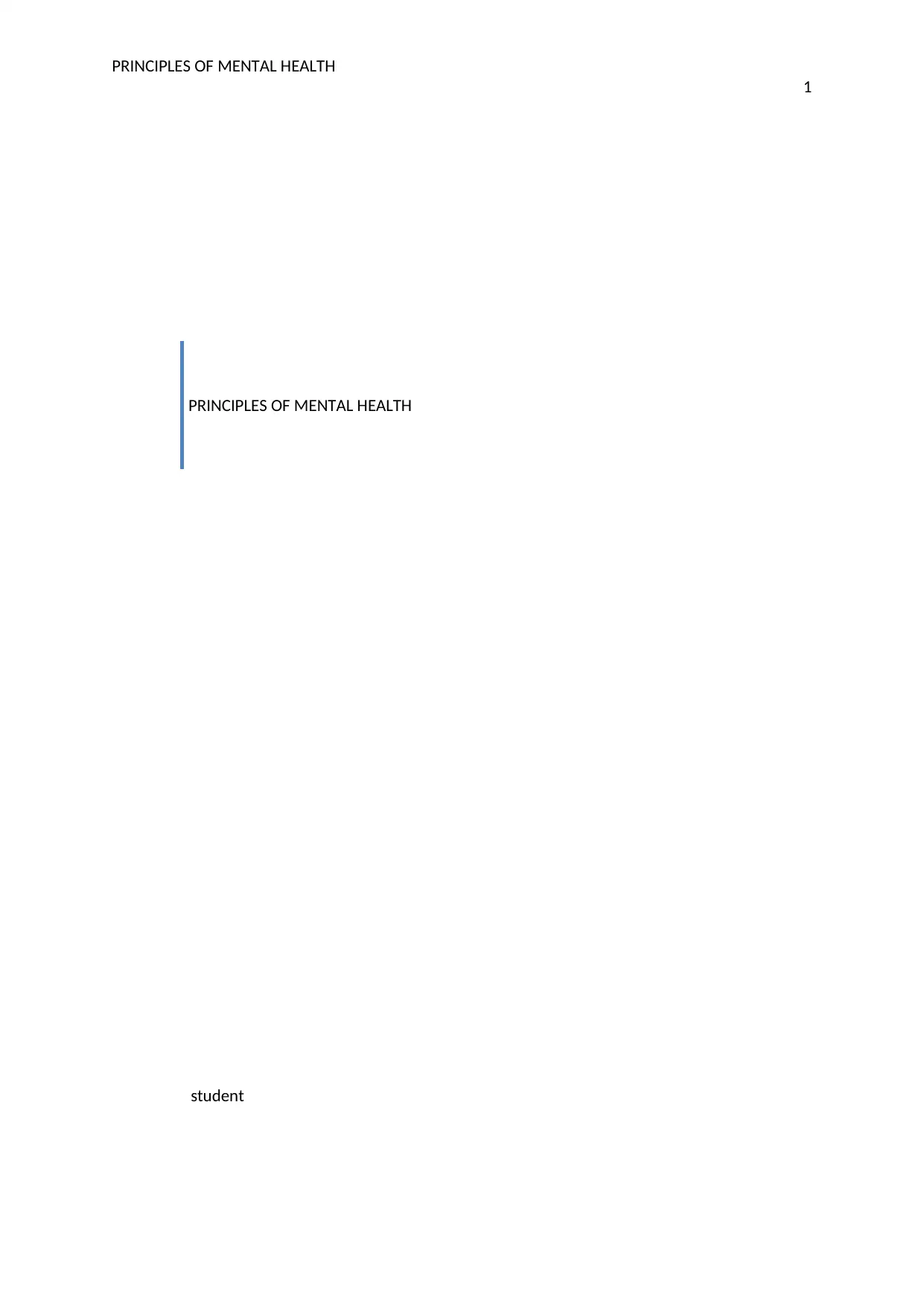
PRINCIPLES OF MENTAL HEALTH
1
PRINCIPLES OF MENTAL HEALTH
student
1
PRINCIPLES OF MENTAL HEALTH
student
Secure Best Marks with AI Grader
Need help grading? Try our AI Grader for instant feedback on your assignments.
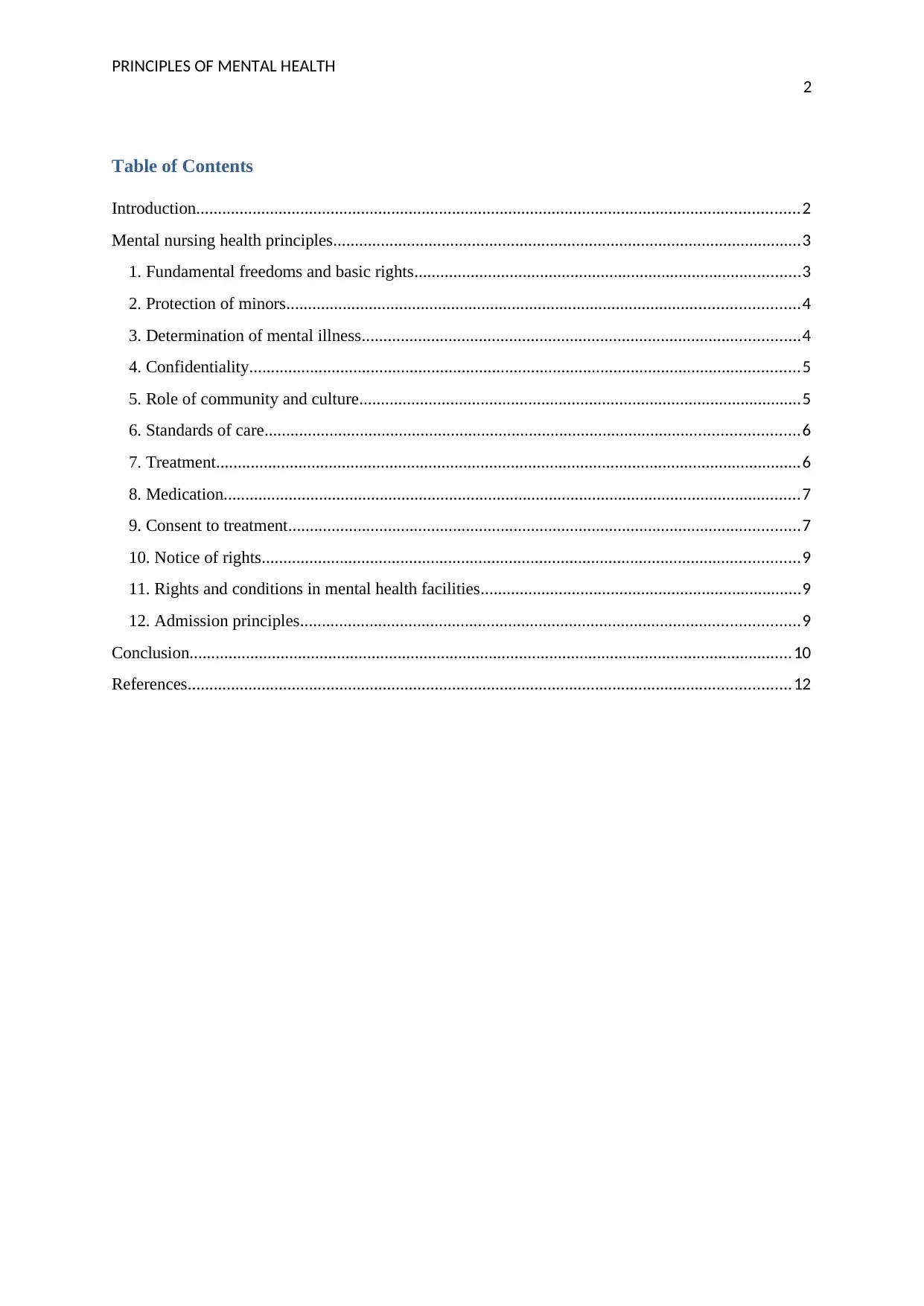
PRINCIPLES OF MENTAL HEALTH
2
Table of Contents
Introduction...........................................................................................................................................2
Mental nursing health principles............................................................................................................3
1. Fundamental freedoms and basic rights.........................................................................................3
2. Protection of minors......................................................................................................................4
3. Determination of mental illness.....................................................................................................4
4. Confidentiality...............................................................................................................................5
5. Role of community and culture......................................................................................................5
6. Standards of care...........................................................................................................................6
7. Treatment.......................................................................................................................................6
8. Medication.....................................................................................................................................7
9. Consent to treatment......................................................................................................................7
10. Notice of rights............................................................................................................................9
11. Rights and conditions in mental health facilities..........................................................................9
12. Admission principles...................................................................................................................9
Conclusion...........................................................................................................................................10
References...........................................................................................................................................12
2
Table of Contents
Introduction...........................................................................................................................................2
Mental nursing health principles............................................................................................................3
1. Fundamental freedoms and basic rights.........................................................................................3
2. Protection of minors......................................................................................................................4
3. Determination of mental illness.....................................................................................................4
4. Confidentiality...............................................................................................................................5
5. Role of community and culture......................................................................................................5
6. Standards of care...........................................................................................................................6
7. Treatment.......................................................................................................................................6
8. Medication.....................................................................................................................................7
9. Consent to treatment......................................................................................................................7
10. Notice of rights............................................................................................................................9
11. Rights and conditions in mental health facilities..........................................................................9
12. Admission principles...................................................................................................................9
Conclusion...........................................................................................................................................10
References...........................................................................................................................................12
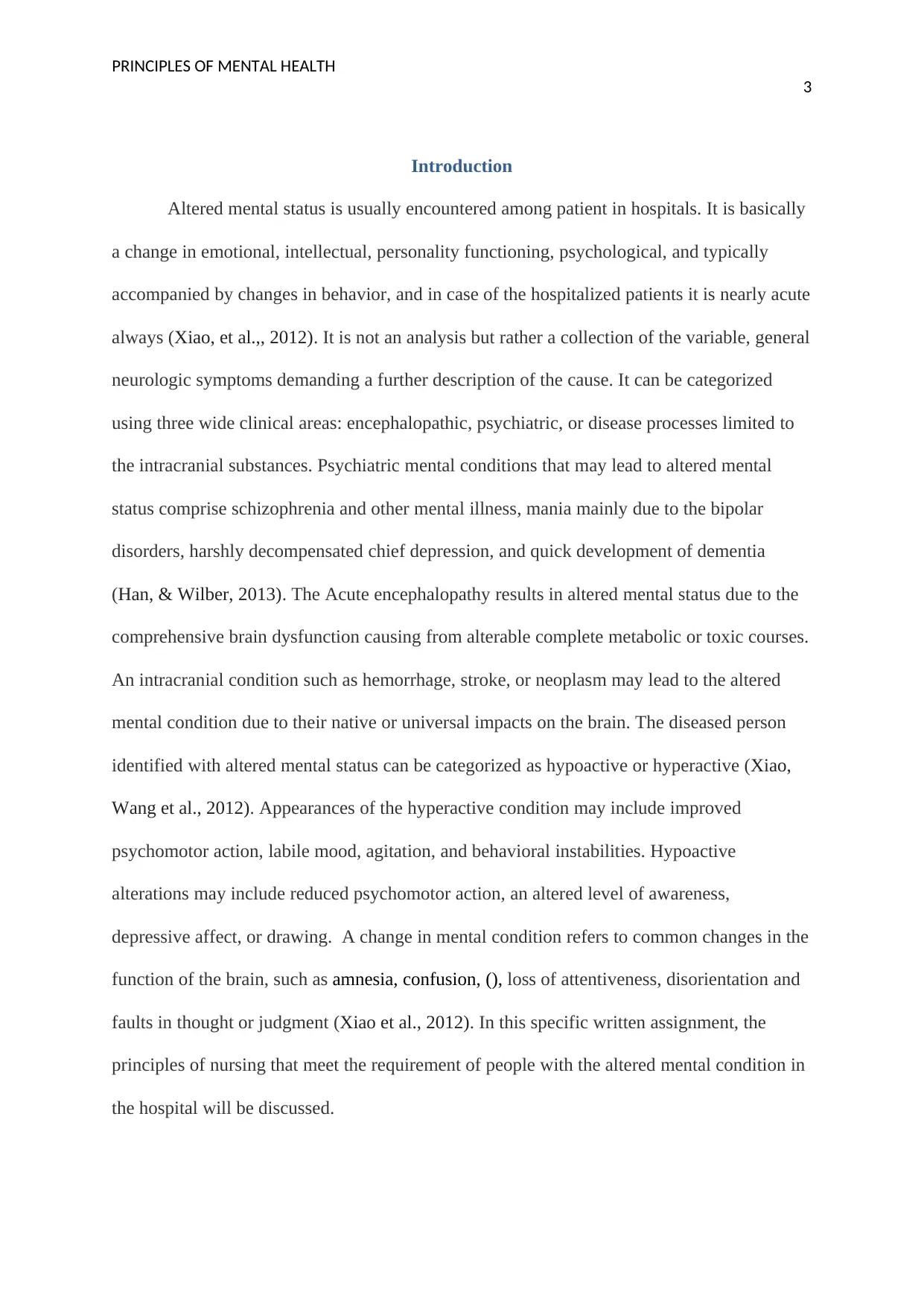
PRINCIPLES OF MENTAL HEALTH
3
Introduction
Altered mental status is usually encountered among patient in hospitals. It is basically
a change in emotional, intellectual, personality functioning, psychological, and typically
accompanied by changes in behavior, and in case of the hospitalized patients it is nearly acute
always (Xiao, et al.,, 2012). It is not an analysis but rather a collection of the variable, general
neurologic symptoms demanding a further description of the cause. It can be categorized
using three wide clinical areas: encephalopathic, psychiatric, or disease processes limited to
the intracranial substances. Psychiatric mental conditions that may lead to altered mental
status comprise schizophrenia and other mental illness, mania mainly due to the bipolar
disorders, harshly decompensated chief depression, and quick development of dementia
(Han, & Wilber, 2013). The Acute encephalopathy results in altered mental status due to the
comprehensive brain dysfunction causing from alterable complete metabolic or toxic courses.
An intracranial condition such as hemorrhage, stroke, or neoplasm may lead to the altered
mental condition due to their native or universal impacts on the brain. The diseased person
identified with altered mental status can be categorized as hypoactive or hyperactive (Xiao,
Wang et al., 2012). Appearances of the hyperactive condition may include improved
psychomotor action, labile mood, agitation, and behavioral instabilities. Hypoactive
alterations may include reduced psychomotor action, an altered level of awareness,
depressive affect, or drawing. A change in mental condition refers to common changes in the
function of the brain, such as amnesia, confusion, (), loss of attentiveness, disorientation and
faults in thought or judgment (Xiao et al., 2012). In this specific written assignment, the
principles of nursing that meet the requirement of people with the altered mental condition in
the hospital will be discussed.
3
Introduction
Altered mental status is usually encountered among patient in hospitals. It is basically
a change in emotional, intellectual, personality functioning, psychological, and typically
accompanied by changes in behavior, and in case of the hospitalized patients it is nearly acute
always (Xiao, et al.,, 2012). It is not an analysis but rather a collection of the variable, general
neurologic symptoms demanding a further description of the cause. It can be categorized
using three wide clinical areas: encephalopathic, psychiatric, or disease processes limited to
the intracranial substances. Psychiatric mental conditions that may lead to altered mental
status comprise schizophrenia and other mental illness, mania mainly due to the bipolar
disorders, harshly decompensated chief depression, and quick development of dementia
(Han, & Wilber, 2013). The Acute encephalopathy results in altered mental status due to the
comprehensive brain dysfunction causing from alterable complete metabolic or toxic courses.
An intracranial condition such as hemorrhage, stroke, or neoplasm may lead to the altered
mental condition due to their native or universal impacts on the brain. The diseased person
identified with altered mental status can be categorized as hypoactive or hyperactive (Xiao,
Wang et al., 2012). Appearances of the hyperactive condition may include improved
psychomotor action, labile mood, agitation, and behavioral instabilities. Hypoactive
alterations may include reduced psychomotor action, an altered level of awareness,
depressive affect, or drawing. A change in mental condition refers to common changes in the
function of the brain, such as amnesia, confusion, (), loss of attentiveness, disorientation and
faults in thought or judgment (Xiao et al., 2012). In this specific written assignment, the
principles of nursing that meet the requirement of people with the altered mental condition in
the hospital will be discussed.
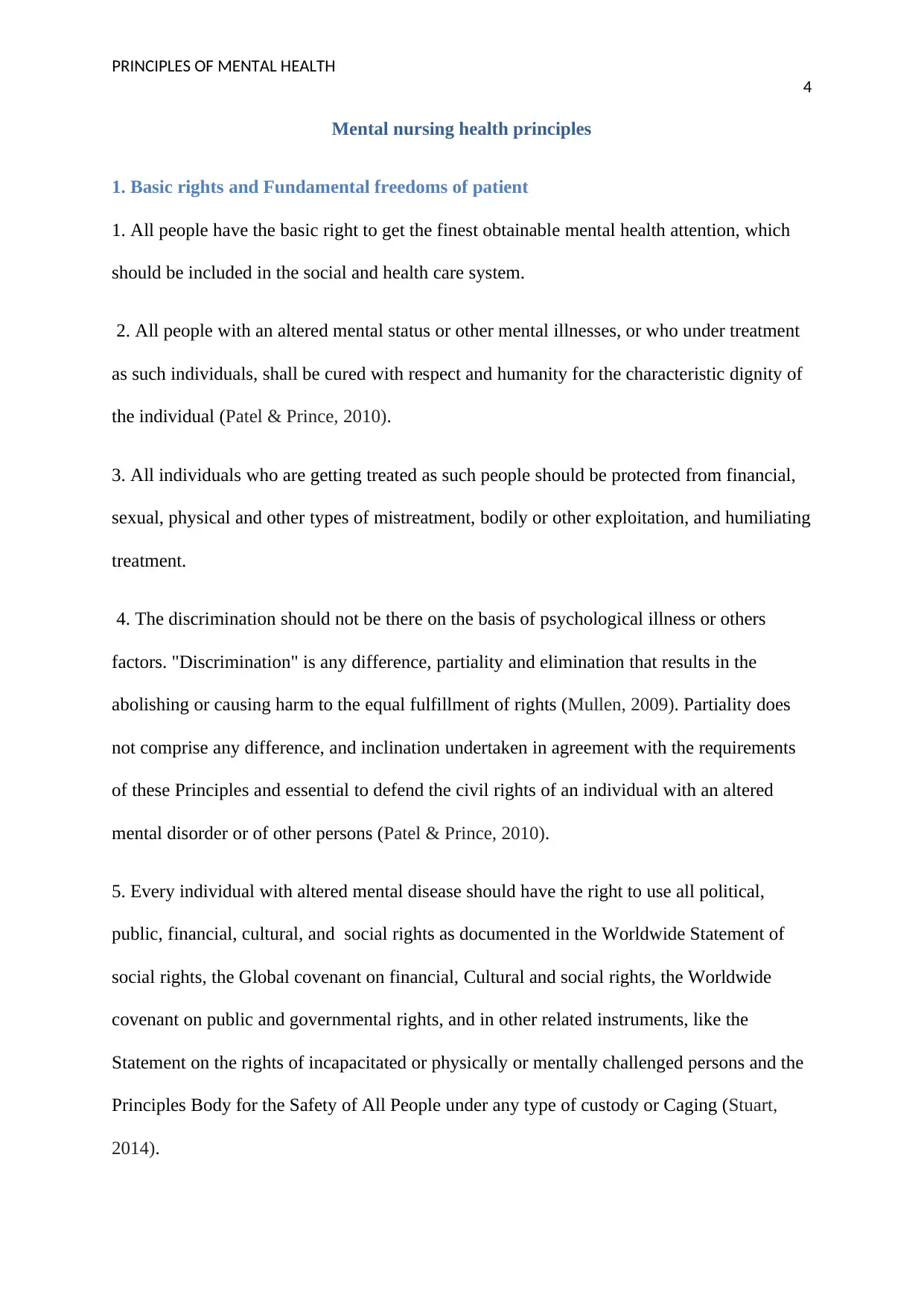
PRINCIPLES OF MENTAL HEALTH
4
Mental nursing health principles
1. Basic rights and Fundamental freedoms of patient
1. All people have the basic right to get the finest obtainable mental health attention, which
should be included in the social and health care system.
2. All people with an altered mental status or other mental illnesses, or who under treatment
as such individuals, shall be cured with respect and humanity for the characteristic dignity of
the individual (Patel & Prince, 2010).
3. All individuals who are getting treated as such people should be protected from financial,
sexual, physical and other types of mistreatment, bodily or other exploitation, and humiliating
treatment.
4. The discrimination should not be there on the basis of psychological illness or others
factors. "Discrimination" is any difference, partiality and elimination that results in the
abolishing or causing harm to the equal fulfillment of rights (Mullen, 2009). Partiality does
not comprise any difference, and inclination undertaken in agreement with the requirements
of these Principles and essential to defend the civil rights of an individual with an altered
mental disorder or of other persons (Patel & Prince, 2010).
5. Every individual with altered mental disease should have the right to use all political,
public, financial, cultural, and social rights as documented in the Worldwide Statement of
social rights, the Global covenant on financial, Cultural and social rights, the Worldwide
covenant on public and governmental rights, and in other related instruments, like the
Statement on the rights of incapacitated or physically or mentally challenged persons and the
Principles Body for the Safety of All People under any type of custody or Caging (Stuart,
2014).
4
Mental nursing health principles
1. Basic rights and Fundamental freedoms of patient
1. All people have the basic right to get the finest obtainable mental health attention, which
should be included in the social and health care system.
2. All people with an altered mental status or other mental illnesses, or who under treatment
as such individuals, shall be cured with respect and humanity for the characteristic dignity of
the individual (Patel & Prince, 2010).
3. All individuals who are getting treated as such people should be protected from financial,
sexual, physical and other types of mistreatment, bodily or other exploitation, and humiliating
treatment.
4. The discrimination should not be there on the basis of psychological illness or others
factors. "Discrimination" is any difference, partiality and elimination that results in the
abolishing or causing harm to the equal fulfillment of rights (Mullen, 2009). Partiality does
not comprise any difference, and inclination undertaken in agreement with the requirements
of these Principles and essential to defend the civil rights of an individual with an altered
mental disorder or of other persons (Patel & Prince, 2010).
5. Every individual with altered mental disease should have the right to use all political,
public, financial, cultural, and social rights as documented in the Worldwide Statement of
social rights, the Global covenant on financial, Cultural and social rights, the Worldwide
covenant on public and governmental rights, and in other related instruments, like the
Statement on the rights of incapacitated or physically or mentally challenged persons and the
Principles Body for the Safety of All People under any type of custody or Caging (Stuart,
2014).
Secure Best Marks with AI Grader
Need help grading? Try our AI Grader for instant feedback on your assignments.
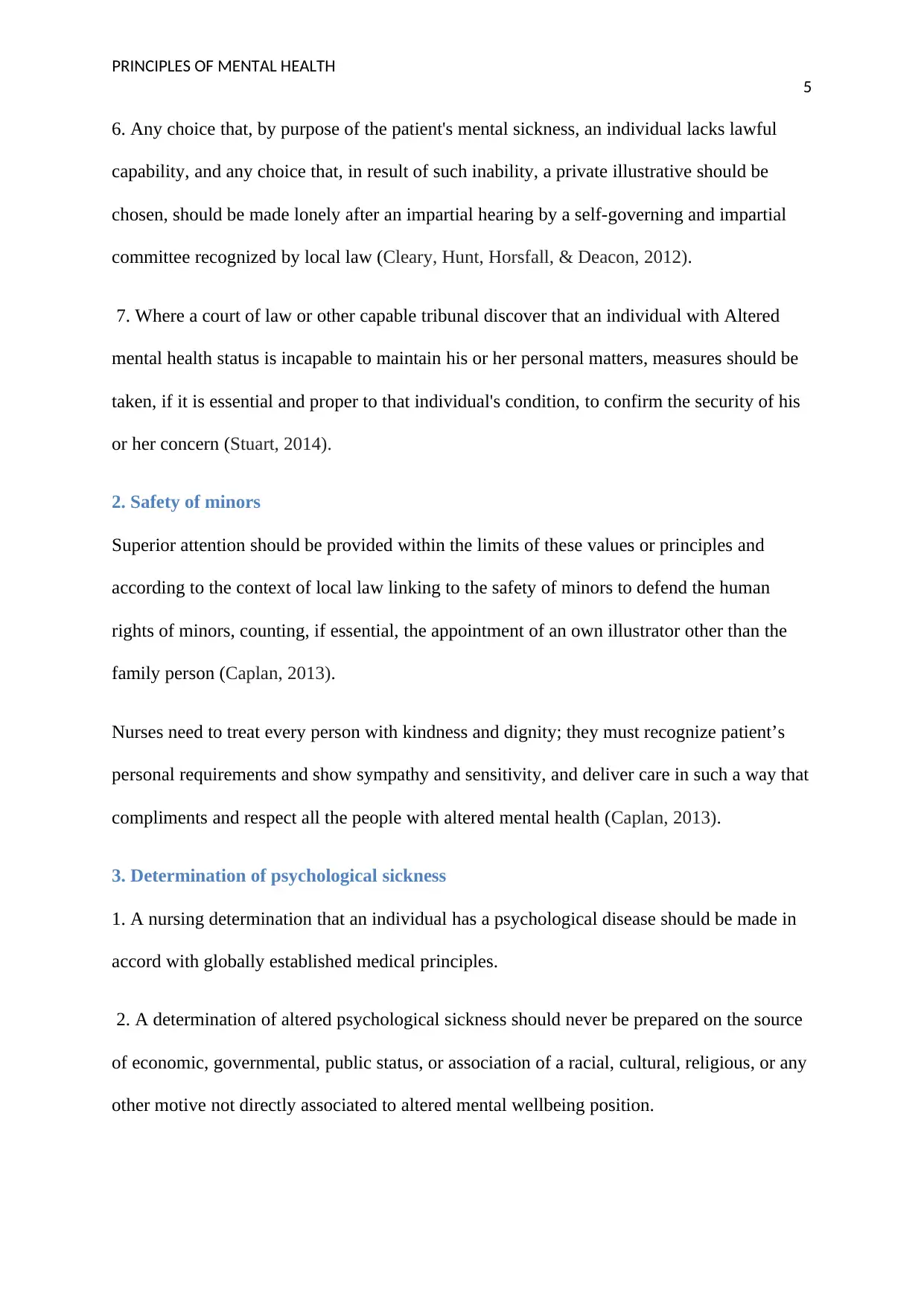
PRINCIPLES OF MENTAL HEALTH
5
6. Any choice that, by purpose of the patient's mental sickness, an individual lacks lawful
capability, and any choice that, in result of such inability, a private illustrative should be
chosen, should be made lonely after an impartial hearing by a self-governing and impartial
committee recognized by local law (Cleary, Hunt, Horsfall, & Deacon, 2012).
7. Where a court of law or other capable tribunal discover that an individual with Altered
mental health status is incapable to maintain his or her personal matters, measures should be
taken, if it is essential and proper to that individual's condition, to confirm the security of his
or her concern (Stuart, 2014).
2. Safety of minors
Superior attention should be provided within the limits of these values or principles and
according to the context of local law linking to the safety of minors to defend the human
rights of minors, counting, if essential, the appointment of an own illustrator other than the
family person (Caplan, 2013).
Nurses need to treat every person with kindness and dignity; they must recognize patient’s
personal requirements and show sympathy and sensitivity, and deliver care in such a way that
compliments and respect all the people with altered mental health (Caplan, 2013).
3. Determination of psychological sickness
1. A nursing determination that an individual has a psychological disease should be made in
accord with globally established medical principles.
2. A determination of altered psychological sickness should never be prepared on the source
of economic, governmental, public status, or association of a racial, cultural, religious, or any
other motive not directly associated to altered mental wellbeing position.
5
6. Any choice that, by purpose of the patient's mental sickness, an individual lacks lawful
capability, and any choice that, in result of such inability, a private illustrative should be
chosen, should be made lonely after an impartial hearing by a self-governing and impartial
committee recognized by local law (Cleary, Hunt, Horsfall, & Deacon, 2012).
7. Where a court of law or other capable tribunal discover that an individual with Altered
mental health status is incapable to maintain his or her personal matters, measures should be
taken, if it is essential and proper to that individual's condition, to confirm the security of his
or her concern (Stuart, 2014).
2. Safety of minors
Superior attention should be provided within the limits of these values or principles and
according to the context of local law linking to the safety of minors to defend the human
rights of minors, counting, if essential, the appointment of an own illustrator other than the
family person (Caplan, 2013).
Nurses need to treat every person with kindness and dignity; they must recognize patient’s
personal requirements and show sympathy and sensitivity, and deliver care in such a way that
compliments and respect all the people with altered mental health (Caplan, 2013).
3. Determination of psychological sickness
1. A nursing determination that an individual has a psychological disease should be made in
accord with globally established medical principles.
2. A determination of altered psychological sickness should never be prepared on the source
of economic, governmental, public status, or association of a racial, cultural, religious, or any
other motive not directly associated to altered mental wellbeing position.
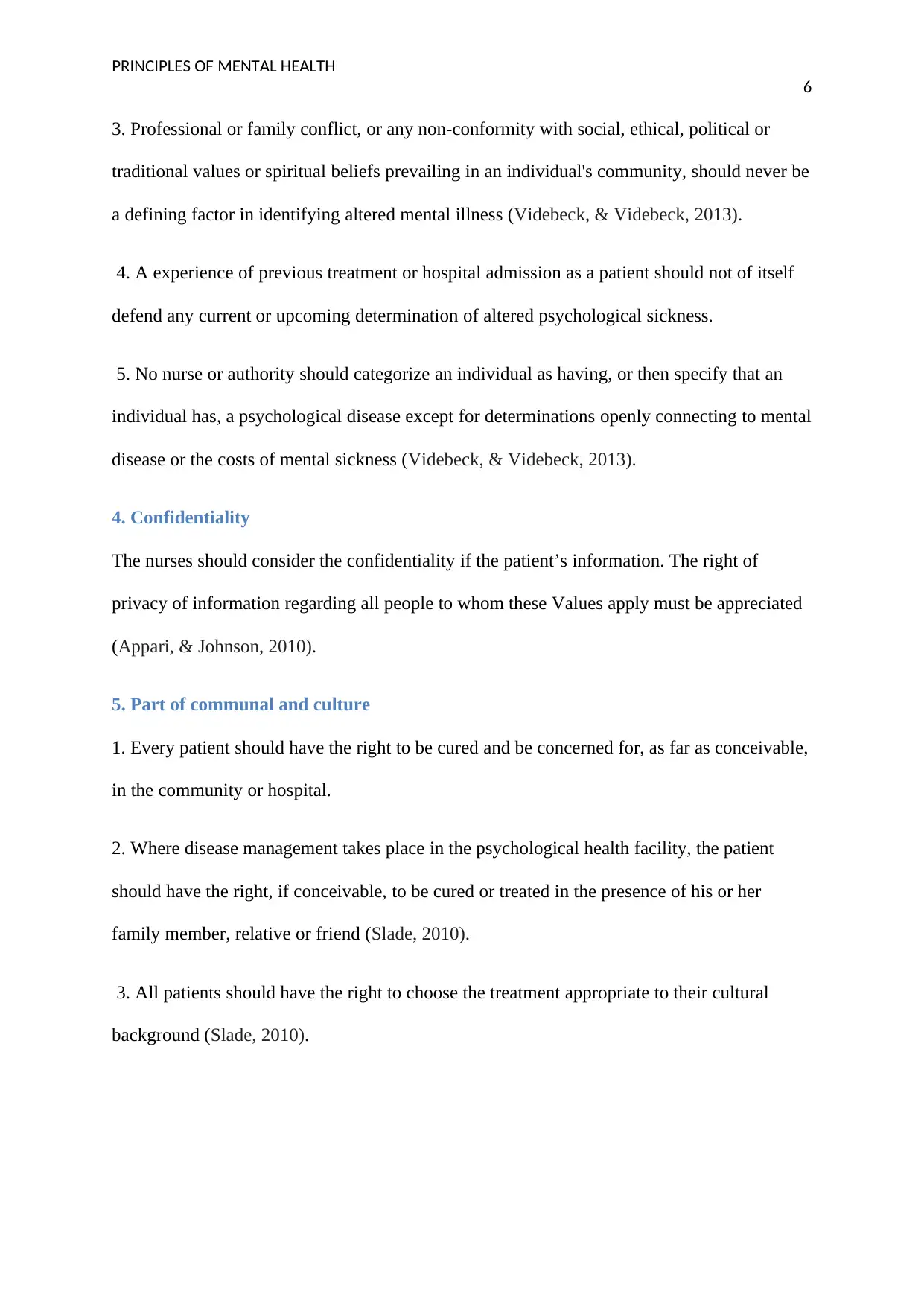
PRINCIPLES OF MENTAL HEALTH
6
3. Professional or family conflict, or any non-conformity with social, ethical, political or
traditional values or spiritual beliefs prevailing in an individual's community, should never be
a defining factor in identifying altered mental illness (Videbeck, & Videbeck, 2013).
4. A experience of previous treatment or hospital admission as a patient should not of itself
defend any current or upcoming determination of altered psychological sickness.
5. No nurse or authority should categorize an individual as having, or then specify that an
individual has, a psychological disease except for determinations openly connecting to mental
disease or the costs of mental sickness (Videbeck, & Videbeck, 2013).
4. Confidentiality
The nurses should consider the confidentiality if the patient’s information. The right of
privacy of information regarding all people to whom these Values apply must be appreciated
(Appari, & Johnson, 2010).
5. Part of communal and culture
1. Every patient should have the right to be cured and be concerned for, as far as conceivable,
in the community or hospital.
2. Where disease management takes place in the psychological health facility, the patient
should have the right, if conceivable, to be cured or treated in the presence of his or her
family member, relative or friend (Slade, 2010).
3. All patients should have the right to choose the treatment appropriate to their cultural
background (Slade, 2010).
6
3. Professional or family conflict, or any non-conformity with social, ethical, political or
traditional values or spiritual beliefs prevailing in an individual's community, should never be
a defining factor in identifying altered mental illness (Videbeck, & Videbeck, 2013).
4. A experience of previous treatment or hospital admission as a patient should not of itself
defend any current or upcoming determination of altered psychological sickness.
5. No nurse or authority should categorize an individual as having, or then specify that an
individual has, a psychological disease except for determinations openly connecting to mental
disease or the costs of mental sickness (Videbeck, & Videbeck, 2013).
4. Confidentiality
The nurses should consider the confidentiality if the patient’s information. The right of
privacy of information regarding all people to whom these Values apply must be appreciated
(Appari, & Johnson, 2010).
5. Part of communal and culture
1. Every patient should have the right to be cured and be concerned for, as far as conceivable,
in the community or hospital.
2. Where disease management takes place in the psychological health facility, the patient
should have the right, if conceivable, to be cured or treated in the presence of his or her
family member, relative or friend (Slade, 2010).
3. All patients should have the right to choose the treatment appropriate to their cultural
background (Slade, 2010).
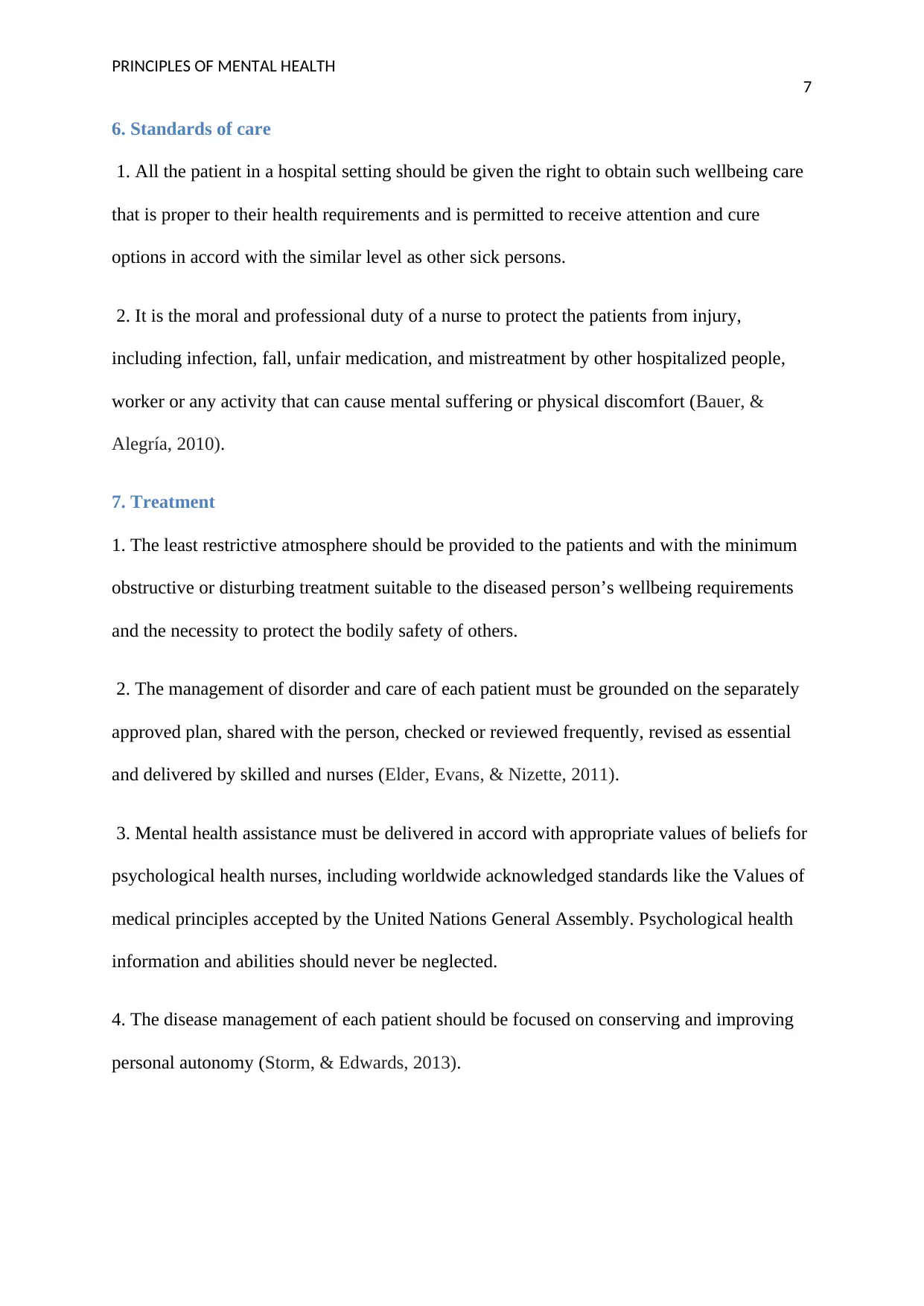
PRINCIPLES OF MENTAL HEALTH
7
6. Standards of care
1. All the patient in a hospital setting should be given the right to obtain such wellbeing care
that is proper to their health requirements and is permitted to receive attention and cure
options in accord with the similar level as other sick persons.
2. It is the moral and professional duty of a nurse to protect the patients from injury,
including infection, fall, unfair medication, and mistreatment by other hospitalized people,
worker or any activity that can cause mental suffering or physical discomfort (Bauer, &
Alegría, 2010).
7. Treatment
1. The least restrictive atmosphere should be provided to the patients and with the minimum
obstructive or disturbing treatment suitable to the diseased person’s wellbeing requirements
and the necessity to protect the bodily safety of others.
2. The management of disorder and care of each patient must be grounded on the separately
approved plan, shared with the person, checked or reviewed frequently, revised as essential
and delivered by skilled and nurses (Elder, Evans, & Nizette, 2011).
3. Mental health assistance must be delivered in accord with appropriate values of beliefs for
psychological health nurses, including worldwide acknowledged standards like the Values of
medical principles accepted by the United Nations General Assembly. Psychological health
information and abilities should never be neglected.
4. The disease management of each patient should be focused on conserving and improving
personal autonomy (Storm, & Edwards, 2013).
7
6. Standards of care
1. All the patient in a hospital setting should be given the right to obtain such wellbeing care
that is proper to their health requirements and is permitted to receive attention and cure
options in accord with the similar level as other sick persons.
2. It is the moral and professional duty of a nurse to protect the patients from injury,
including infection, fall, unfair medication, and mistreatment by other hospitalized people,
worker or any activity that can cause mental suffering or physical discomfort (Bauer, &
Alegría, 2010).
7. Treatment
1. The least restrictive atmosphere should be provided to the patients and with the minimum
obstructive or disturbing treatment suitable to the diseased person’s wellbeing requirements
and the necessity to protect the bodily safety of others.
2. The management of disorder and care of each patient must be grounded on the separately
approved plan, shared with the person, checked or reviewed frequently, revised as essential
and delivered by skilled and nurses (Elder, Evans, & Nizette, 2011).
3. Mental health assistance must be delivered in accord with appropriate values of beliefs for
psychological health nurses, including worldwide acknowledged standards like the Values of
medical principles accepted by the United Nations General Assembly. Psychological health
information and abilities should never be neglected.
4. The disease management of each patient should be focused on conserving and improving
personal autonomy (Storm, & Edwards, 2013).
Paraphrase This Document
Need a fresh take? Get an instant paraphrase of this document with our AI Paraphraser
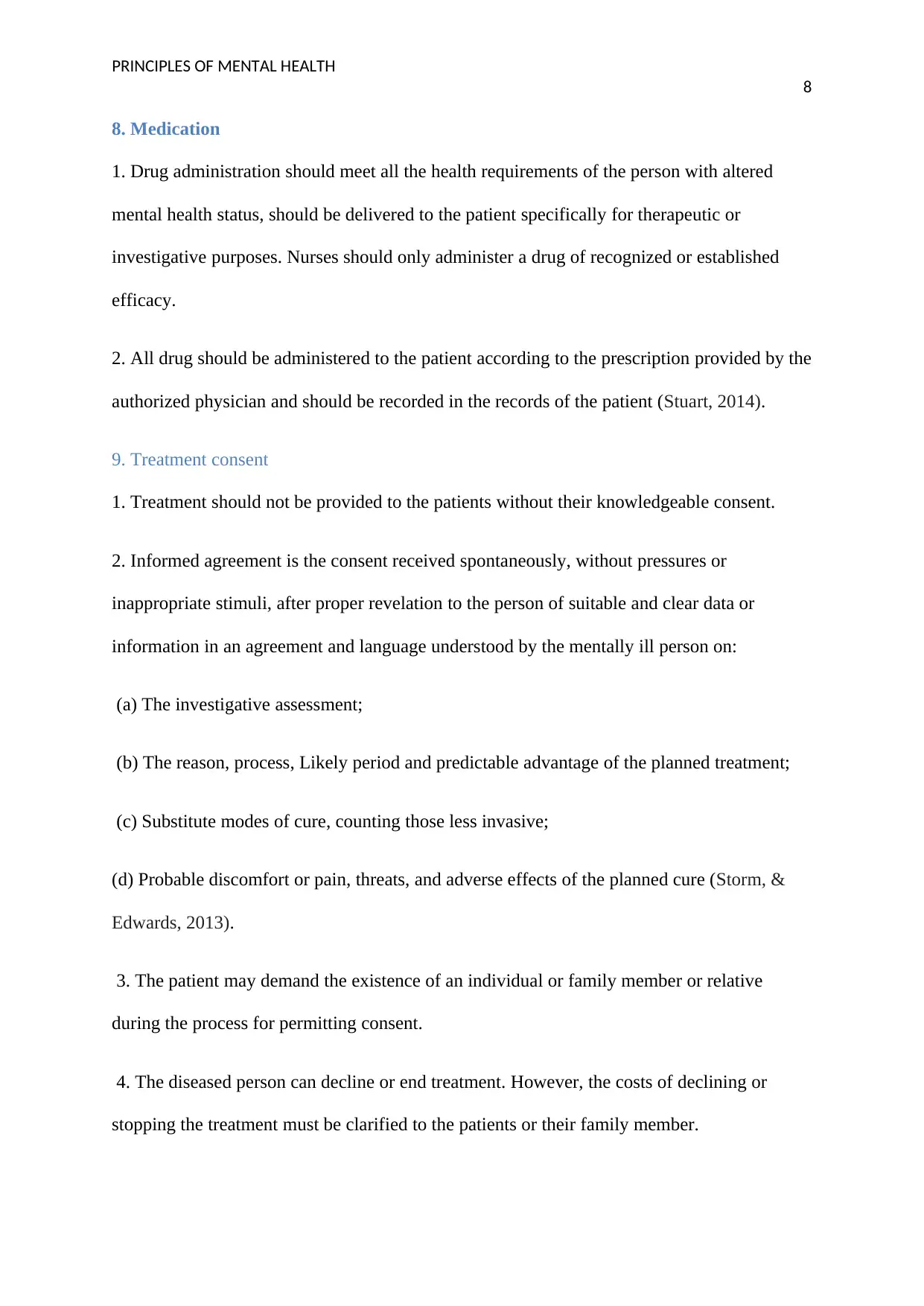
PRINCIPLES OF MENTAL HEALTH
8
8. Medication
1. Drug administration should meet all the health requirements of the person with altered
mental health status, should be delivered to the patient specifically for therapeutic or
investigative purposes. Nurses should only administer a drug of recognized or established
efficacy.
2. All drug should be administered to the patient according to the prescription provided by the
authorized physician and should be recorded in the records of the patient (Stuart, 2014).
9. Treatment consent
1. Treatment should not be provided to the patients without their knowledgeable consent.
2. Informed agreement is the consent received spontaneously, without pressures or
inappropriate stimuli, after proper revelation to the person of suitable and clear data or
information in an agreement and language understood by the mentally ill person on:
(a) The investigative assessment;
(b) The reason, process, Likely period and predictable advantage of the planned treatment;
(c) Substitute modes of cure, counting those less invasive;
(d) Probable discomfort or pain, threats, and adverse effects of the planned cure (Storm, &
Edwards, 2013).
3. The patient may demand the existence of an individual or family member or relative
during the process for permitting consent.
4. The diseased person can decline or end treatment. However, the costs of declining or
stopping the treatment must be clarified to the patients or their family member.
8
8. Medication
1. Drug administration should meet all the health requirements of the person with altered
mental health status, should be delivered to the patient specifically for therapeutic or
investigative purposes. Nurses should only administer a drug of recognized or established
efficacy.
2. All drug should be administered to the patient according to the prescription provided by the
authorized physician and should be recorded in the records of the patient (Stuart, 2014).
9. Treatment consent
1. Treatment should not be provided to the patients without their knowledgeable consent.
2. Informed agreement is the consent received spontaneously, without pressures or
inappropriate stimuli, after proper revelation to the person of suitable and clear data or
information in an agreement and language understood by the mentally ill person on:
(a) The investigative assessment;
(b) The reason, process, Likely period and predictable advantage of the planned treatment;
(c) Substitute modes of cure, counting those less invasive;
(d) Probable discomfort or pain, threats, and adverse effects of the planned cure (Storm, &
Edwards, 2013).
3. The patient may demand the existence of an individual or family member or relative
during the process for permitting consent.
4. The diseased person can decline or end treatment. However, the costs of declining or
stopping the treatment must be clarified to the patients or their family member.
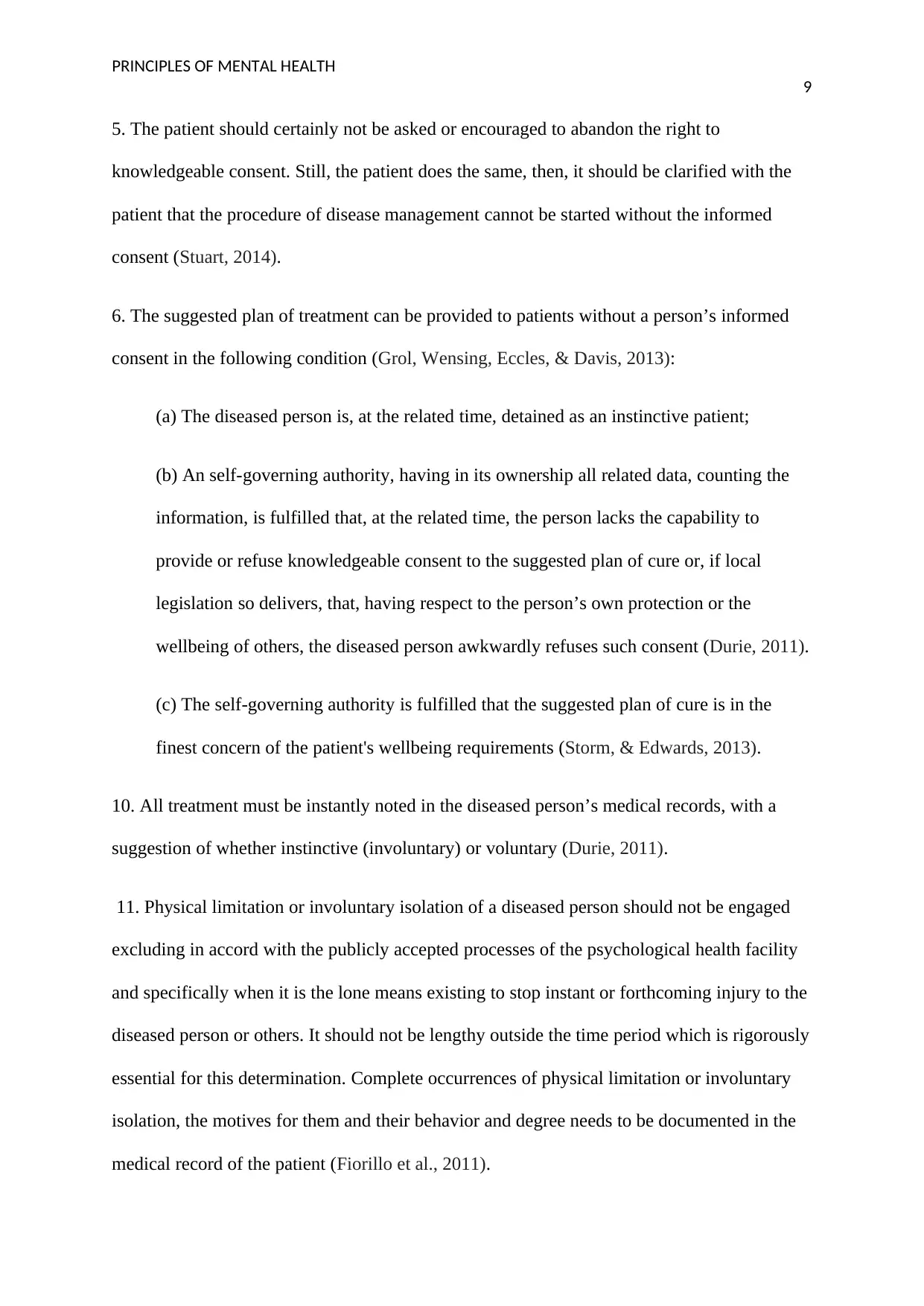
PRINCIPLES OF MENTAL HEALTH
9
5. The patient should certainly not be asked or encouraged to abandon the right to
knowledgeable consent. Still, the patient does the same, then, it should be clarified with the
patient that the procedure of disease management cannot be started without the informed
consent (Stuart, 2014).
6. The suggested plan of treatment can be provided to patients without a person’s informed
consent in the following condition (Grol, Wensing, Eccles, & Davis, 2013):
(a) The diseased person is, at the related time, detained as an instinctive patient;
(b) An self-governing authority, having in its ownership all related data, counting the
information, is fulfilled that, at the related time, the person lacks the capability to
provide or refuse knowledgeable consent to the suggested plan of cure or, if local
legislation so delivers, that, having respect to the person’s own protection or the
wellbeing of others, the diseased person awkwardly refuses such consent (Durie, 2011).
(c) The self-governing authority is fulfilled that the suggested plan of cure is in the
finest concern of the patient's wellbeing requirements (Storm, & Edwards, 2013).
10. All treatment must be instantly noted in the diseased person’s medical records, with a
suggestion of whether instinctive (involuntary) or voluntary (Durie, 2011).
11. Physical limitation or involuntary isolation of a diseased person should not be engaged
excluding in accord with the publicly accepted processes of the psychological health facility
and specifically when it is the lone means existing to stop instant or forthcoming injury to the
diseased person or others. It should not be lengthy outside the time period which is rigorously
essential for this determination. Complete occurrences of physical limitation or involuntary
isolation, the motives for them and their behavior and degree needs to be documented in the
medical record of the patient (Fiorillo et al., 2011).
9
5. The patient should certainly not be asked or encouraged to abandon the right to
knowledgeable consent. Still, the patient does the same, then, it should be clarified with the
patient that the procedure of disease management cannot be started without the informed
consent (Stuart, 2014).
6. The suggested plan of treatment can be provided to patients without a person’s informed
consent in the following condition (Grol, Wensing, Eccles, & Davis, 2013):
(a) The diseased person is, at the related time, detained as an instinctive patient;
(b) An self-governing authority, having in its ownership all related data, counting the
information, is fulfilled that, at the related time, the person lacks the capability to
provide or refuse knowledgeable consent to the suggested plan of cure or, if local
legislation so delivers, that, having respect to the person’s own protection or the
wellbeing of others, the diseased person awkwardly refuses such consent (Durie, 2011).
(c) The self-governing authority is fulfilled that the suggested plan of cure is in the
finest concern of the patient's wellbeing requirements (Storm, & Edwards, 2013).
10. All treatment must be instantly noted in the diseased person’s medical records, with a
suggestion of whether instinctive (involuntary) or voluntary (Durie, 2011).
11. Physical limitation or involuntary isolation of a diseased person should not be engaged
excluding in accord with the publicly accepted processes of the psychological health facility
and specifically when it is the lone means existing to stop instant or forthcoming injury to the
diseased person or others. It should not be lengthy outside the time period which is rigorously
essential for this determination. Complete occurrences of physical limitation or involuntary
isolation, the motives for them and their behavior and degree needs to be documented in the
medical record of the patient (Fiorillo et al., 2011).
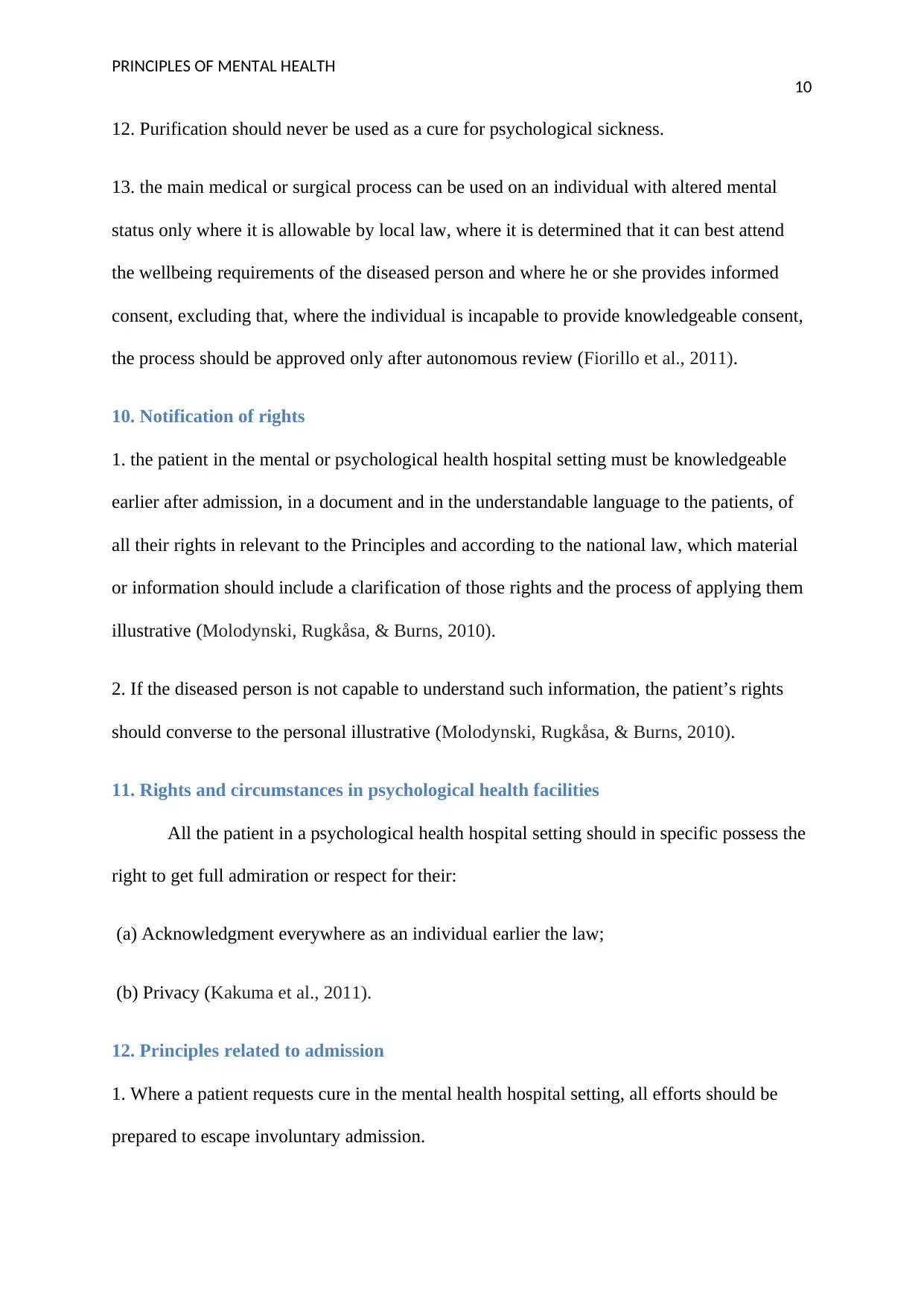
PRINCIPLES OF MENTAL HEALTH
10
12. Purification should never be used as a cure for psychological sickness.
13. the main medical or surgical process can be used on an individual with altered mental
status only where it is allowable by local law, where it is determined that it can best attend
the wellbeing requirements of the diseased person and where he or she provides informed
consent, excluding that, where the individual is incapable to provide knowledgeable consent,
the process should be approved only after autonomous review (Fiorillo et al., 2011).
10. Notification of rights
1. the patient in the mental or psychological health hospital setting must be knowledgeable
earlier after admission, in a document and in the understandable language to the patients, of
all their rights in relevant to the Principles and according to the national law, which material
or information should include a clarification of those rights and the process of applying them
illustrative (Molodynski, Rugkåsa, & Burns, 2010).
2. If the diseased person is not capable to understand such information, the patient’s rights
should converse to the personal illustrative (Molodynski, Rugkåsa, & Burns, 2010).
11. Rights and circumstances in psychological health facilities
All the patient in a psychological health hospital setting should in specific possess the
right to get full admiration or respect for their:
(a) Acknowledgment everywhere as an individual earlier the law;
(b) Privacy (Kakuma et al., 2011).
12. Principles related to admission
1. Where a patient requests cure in the mental health hospital setting, all efforts should be
prepared to escape involuntary admission.
10
12. Purification should never be used as a cure for psychological sickness.
13. the main medical or surgical process can be used on an individual with altered mental
status only where it is allowable by local law, where it is determined that it can best attend
the wellbeing requirements of the diseased person and where he or she provides informed
consent, excluding that, where the individual is incapable to provide knowledgeable consent,
the process should be approved only after autonomous review (Fiorillo et al., 2011).
10. Notification of rights
1. the patient in the mental or psychological health hospital setting must be knowledgeable
earlier after admission, in a document and in the understandable language to the patients, of
all their rights in relevant to the Principles and according to the national law, which material
or information should include a clarification of those rights and the process of applying them
illustrative (Molodynski, Rugkåsa, & Burns, 2010).
2. If the diseased person is not capable to understand such information, the patient’s rights
should converse to the personal illustrative (Molodynski, Rugkåsa, & Burns, 2010).
11. Rights and circumstances in psychological health facilities
All the patient in a psychological health hospital setting should in specific possess the
right to get full admiration or respect for their:
(a) Acknowledgment everywhere as an individual earlier the law;
(b) Privacy (Kakuma et al., 2011).
12. Principles related to admission
1. Where a patient requests cure in the mental health hospital setting, all efforts should be
prepared to escape involuntary admission.
Secure Best Marks with AI Grader
Need help grading? Try our AI Grader for instant feedback on your assignments.
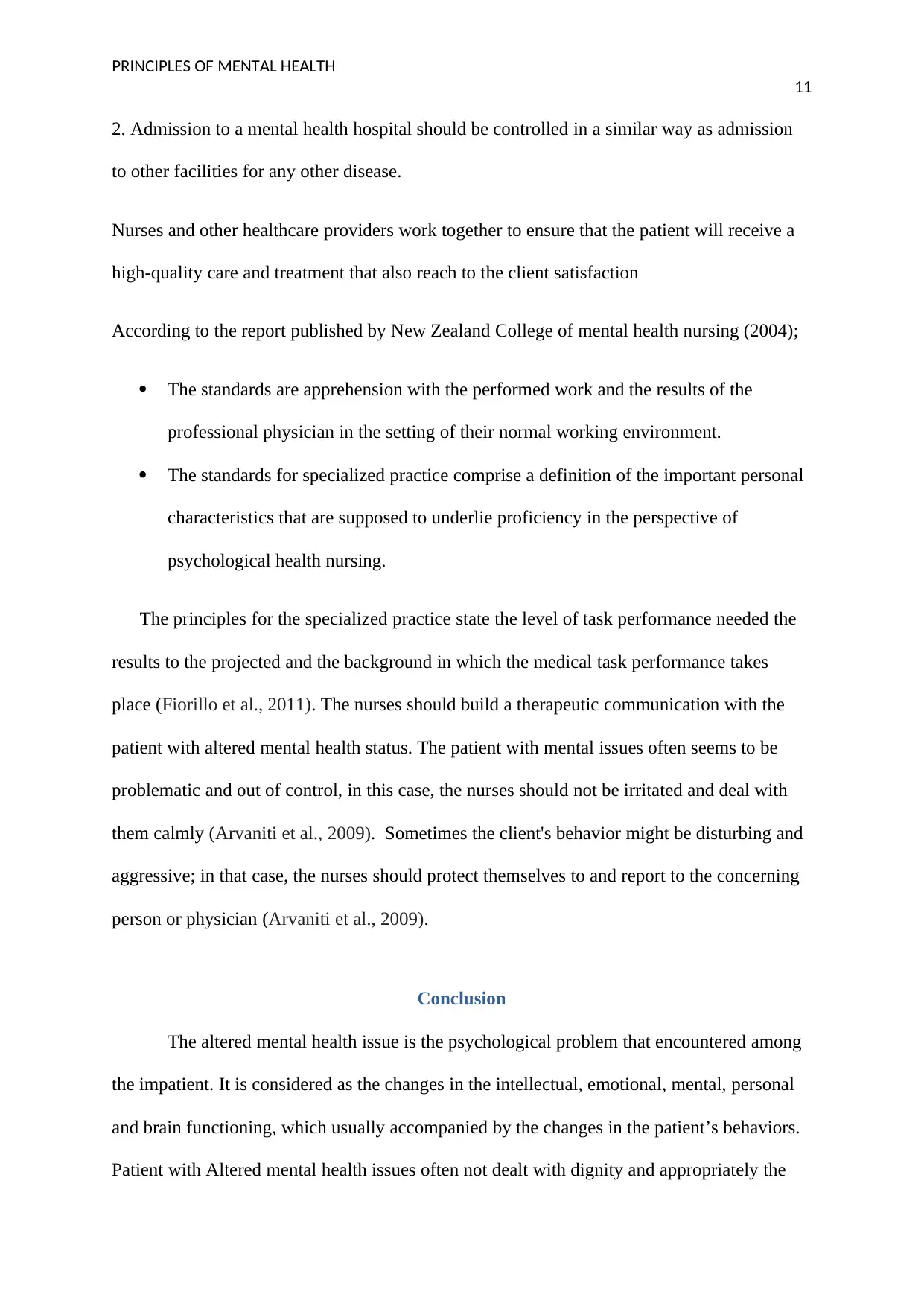
PRINCIPLES OF MENTAL HEALTH
11
2. Admission to a mental health hospital should be controlled in a similar way as admission
to other facilities for any other disease.
Nurses and other healthcare providers work together to ensure that the patient will receive a
high-quality care and treatment that also reach to the client satisfaction
According to the report published by New Zealand College of mental health nursing (2004);
The standards are apprehension with the performed work and the results of the
professional physician in the setting of their normal working environment.
The standards for specialized practice comprise a definition of the important personal
characteristics that are supposed to underlie proficiency in the perspective of
psychological health nursing.
The principles for the specialized practice state the level of task performance needed the
results to the projected and the background in which the medical task performance takes
place (Fiorillo et al., 2011). The nurses should build a therapeutic communication with the
patient with altered mental health status. The patient with mental issues often seems to be
problematic and out of control, in this case, the nurses should not be irritated and deal with
them calmly (Arvaniti et al., 2009). Sometimes the client's behavior might be disturbing and
aggressive; in that case, the nurses should protect themselves to and report to the concerning
person or physician (Arvaniti et al., 2009).
Conclusion
The altered mental health issue is the psychological problem that encountered among
the impatient. It is considered as the changes in the intellectual, emotional, mental, personal
and brain functioning, which usually accompanied by the changes in the patient’s behaviors.
Patient with Altered mental health issues often not dealt with dignity and appropriately the
11
2. Admission to a mental health hospital should be controlled in a similar way as admission
to other facilities for any other disease.
Nurses and other healthcare providers work together to ensure that the patient will receive a
high-quality care and treatment that also reach to the client satisfaction
According to the report published by New Zealand College of mental health nursing (2004);
The standards are apprehension with the performed work and the results of the
professional physician in the setting of their normal working environment.
The standards for specialized practice comprise a definition of the important personal
characteristics that are supposed to underlie proficiency in the perspective of
psychological health nursing.
The principles for the specialized practice state the level of task performance needed the
results to the projected and the background in which the medical task performance takes
place (Fiorillo et al., 2011). The nurses should build a therapeutic communication with the
patient with altered mental health status. The patient with mental issues often seems to be
problematic and out of control, in this case, the nurses should not be irritated and deal with
them calmly (Arvaniti et al., 2009). Sometimes the client's behavior might be disturbing and
aggressive; in that case, the nurses should protect themselves to and report to the concerning
person or physician (Arvaniti et al., 2009).
Conclusion
The altered mental health issue is the psychological problem that encountered among
the impatient. It is considered as the changes in the intellectual, emotional, mental, personal
and brain functioning, which usually accompanied by the changes in the patient’s behaviors.
Patient with Altered mental health issues often not dealt with dignity and appropriately the
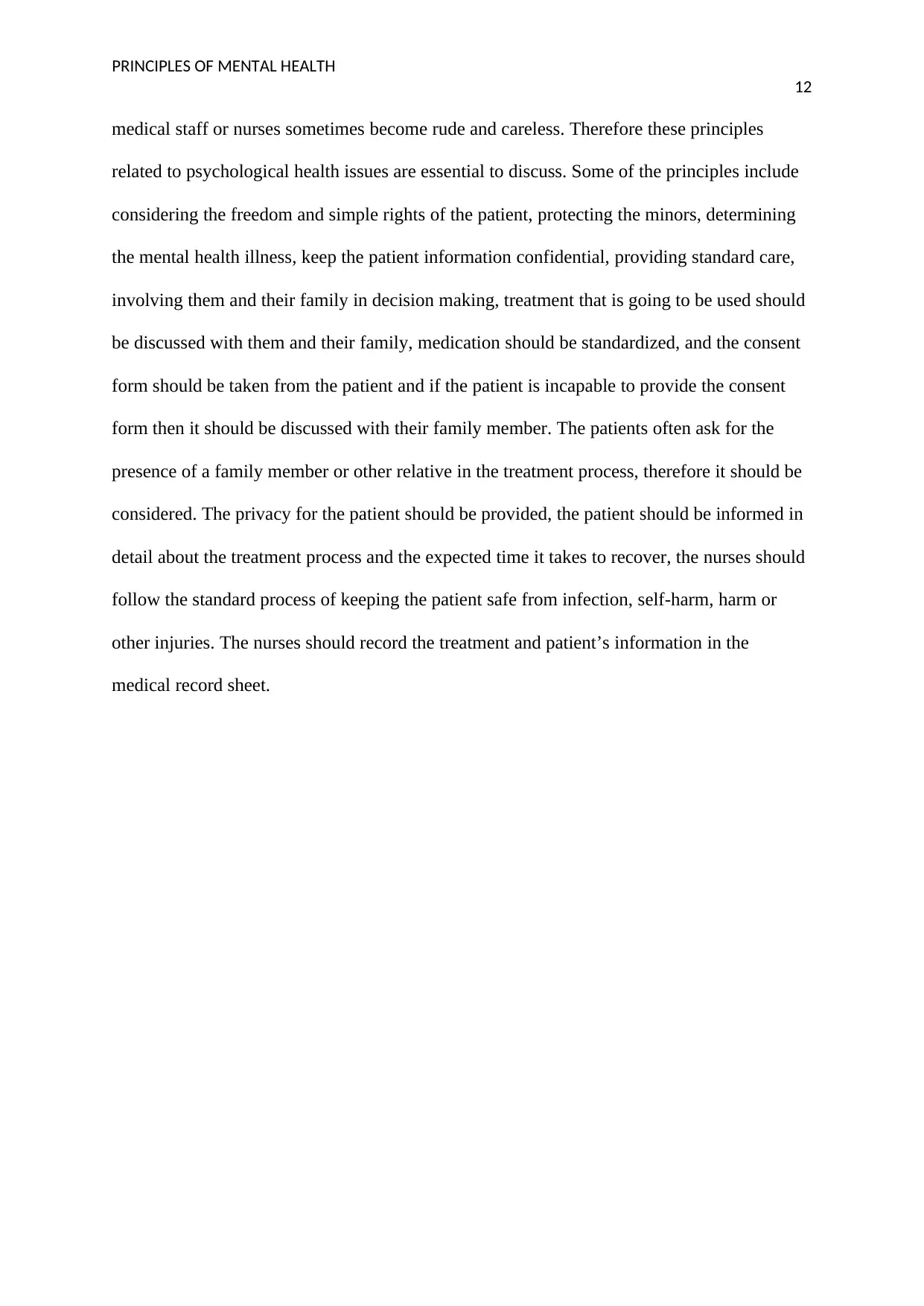
PRINCIPLES OF MENTAL HEALTH
12
medical staff or nurses sometimes become rude and careless. Therefore these principles
related to psychological health issues are essential to discuss. Some of the principles include
considering the freedom and simple rights of the patient, protecting the minors, determining
the mental health illness, keep the patient information confidential, providing standard care,
involving them and their family in decision making, treatment that is going to be used should
be discussed with them and their family, medication should be standardized, and the consent
form should be taken from the patient and if the patient is incapable to provide the consent
form then it should be discussed with their family member. The patients often ask for the
presence of a family member or other relative in the treatment process, therefore it should be
considered. The privacy for the patient should be provided, the patient should be informed in
detail about the treatment process and the expected time it takes to recover, the nurses should
follow the standard process of keeping the patient safe from infection, self-harm, harm or
other injuries. The nurses should record the treatment and patient’s information in the
medical record sheet.
12
medical staff or nurses sometimes become rude and careless. Therefore these principles
related to psychological health issues are essential to discuss. Some of the principles include
considering the freedom and simple rights of the patient, protecting the minors, determining
the mental health illness, keep the patient information confidential, providing standard care,
involving them and their family in decision making, treatment that is going to be used should
be discussed with them and their family, medication should be standardized, and the consent
form should be taken from the patient and if the patient is incapable to provide the consent
form then it should be discussed with their family member. The patients often ask for the
presence of a family member or other relative in the treatment process, therefore it should be
considered. The privacy for the patient should be provided, the patient should be informed in
detail about the treatment process and the expected time it takes to recover, the nurses should
follow the standard process of keeping the patient safe from infection, self-harm, harm or
other injuries. The nurses should record the treatment and patient’s information in the
medical record sheet.
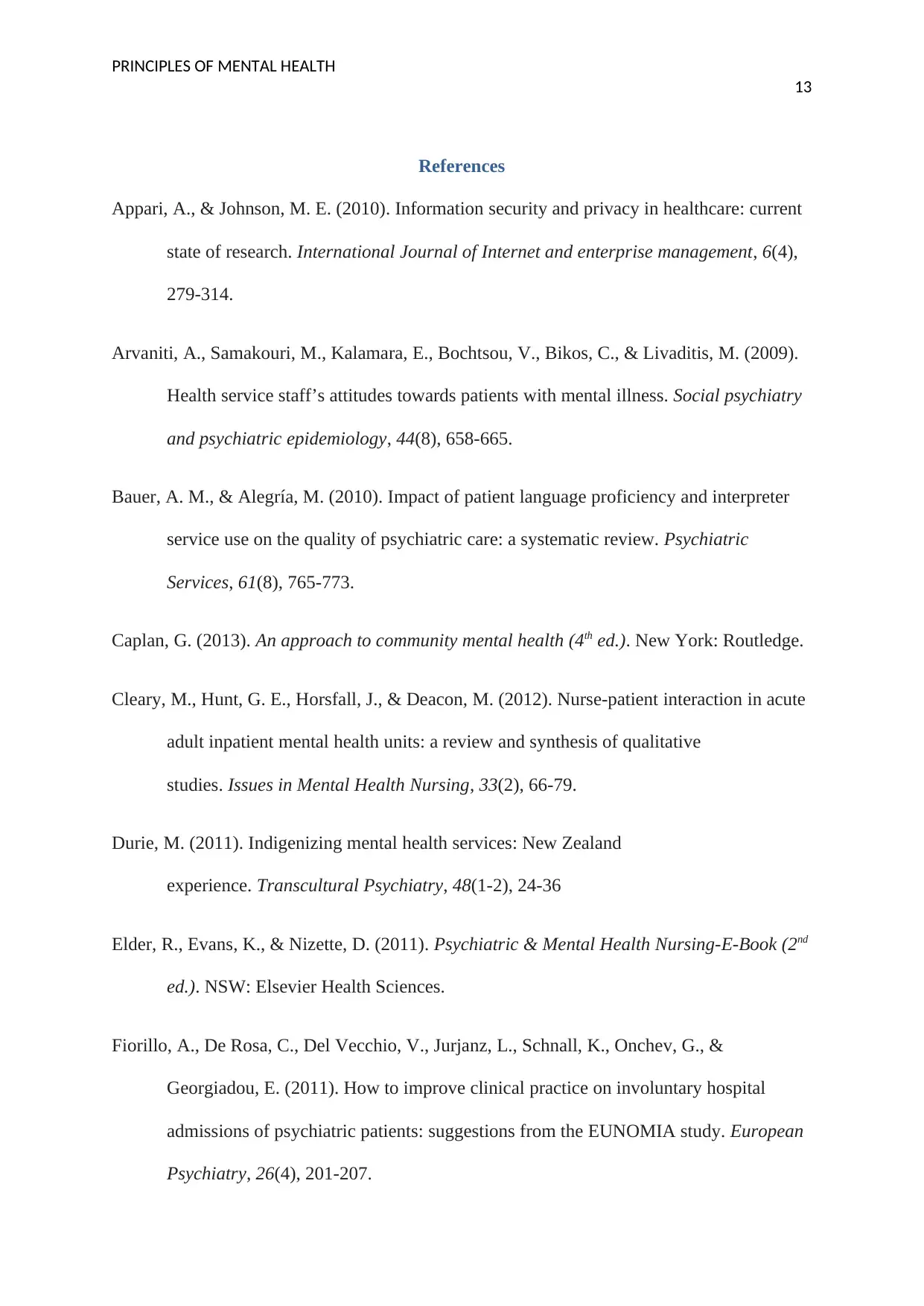
PRINCIPLES OF MENTAL HEALTH
13
References
Appari, A., & Johnson, M. E. (2010). Information security and privacy in healthcare: current
state of research. International Journal of Internet and enterprise management, 6(4),
279-314.
Arvaniti, A., Samakouri, M., Kalamara, E., Bochtsou, V., Bikos, C., & Livaditis, M. (2009).
Health service staff’s attitudes towards patients with mental illness. Social psychiatry
and psychiatric epidemiology, 44(8), 658-665.
Bauer, A. M., & Alegría, M. (2010). Impact of patient language proficiency and interpreter
service use on the quality of psychiatric care: a systematic review. Psychiatric
Services, 61(8), 765-773.
Caplan, G. (2013). An approach to community mental health (4th ed.). New York: Routledge.
Cleary, M., Hunt, G. E., Horsfall, J., & Deacon, M. (2012). Nurse-patient interaction in acute
adult inpatient mental health units: a review and synthesis of qualitative
studies. Issues in Mental Health Nursing, 33(2), 66-79.
Durie, M. (2011). Indigenizing mental health services: New Zealand
experience. Transcultural Psychiatry, 48(1-2), 24-36
Elder, R., Evans, K., & Nizette, D. (2011). Psychiatric & Mental Health Nursing-E-Book (2nd
ed.). NSW: Elsevier Health Sciences.
Fiorillo, A., De Rosa, C., Del Vecchio, V., Jurjanz, L., Schnall, K., Onchev, G., &
Georgiadou, E. (2011). How to improve clinical practice on involuntary hospital
admissions of psychiatric patients: suggestions from the EUNOMIA study. European
Psychiatry, 26(4), 201-207.
13
References
Appari, A., & Johnson, M. E. (2010). Information security and privacy in healthcare: current
state of research. International Journal of Internet and enterprise management, 6(4),
279-314.
Arvaniti, A., Samakouri, M., Kalamara, E., Bochtsou, V., Bikos, C., & Livaditis, M. (2009).
Health service staff’s attitudes towards patients with mental illness. Social psychiatry
and psychiatric epidemiology, 44(8), 658-665.
Bauer, A. M., & Alegría, M. (2010). Impact of patient language proficiency and interpreter
service use on the quality of psychiatric care: a systematic review. Psychiatric
Services, 61(8), 765-773.
Caplan, G. (2013). An approach to community mental health (4th ed.). New York: Routledge.
Cleary, M., Hunt, G. E., Horsfall, J., & Deacon, M. (2012). Nurse-patient interaction in acute
adult inpatient mental health units: a review and synthesis of qualitative
studies. Issues in Mental Health Nursing, 33(2), 66-79.
Durie, M. (2011). Indigenizing mental health services: New Zealand
experience. Transcultural Psychiatry, 48(1-2), 24-36
Elder, R., Evans, K., & Nizette, D. (2011). Psychiatric & Mental Health Nursing-E-Book (2nd
ed.). NSW: Elsevier Health Sciences.
Fiorillo, A., De Rosa, C., Del Vecchio, V., Jurjanz, L., Schnall, K., Onchev, G., &
Georgiadou, E. (2011). How to improve clinical practice on involuntary hospital
admissions of psychiatric patients: suggestions from the EUNOMIA study. European
Psychiatry, 26(4), 201-207.
Paraphrase This Document
Need a fresh take? Get an instant paraphrase of this document with our AI Paraphraser
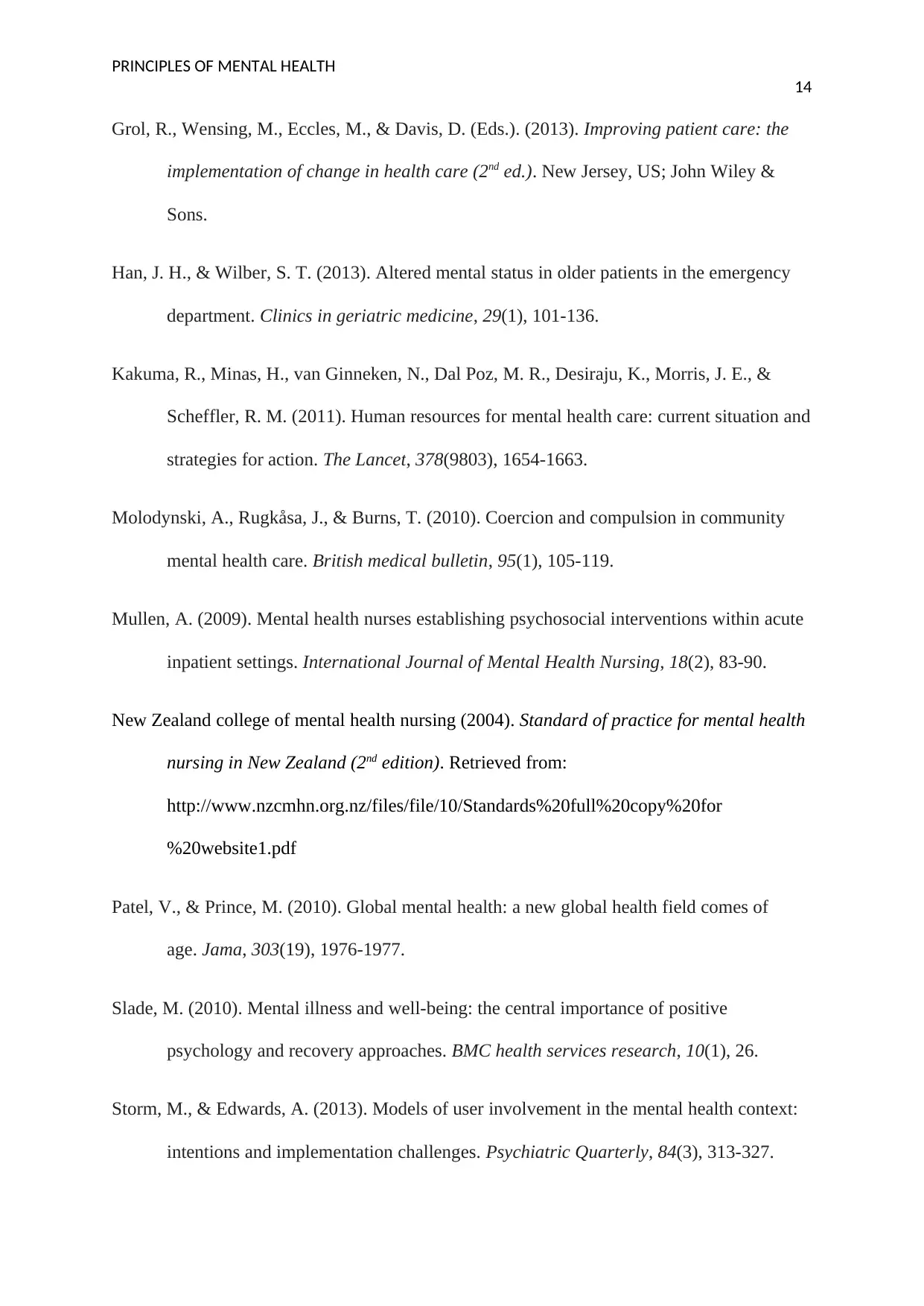
PRINCIPLES OF MENTAL HEALTH
14
Grol, R., Wensing, M., Eccles, M., & Davis, D. (Eds.). (2013). Improving patient care: the
implementation of change in health care (2nd ed.). New Jersey, US; John Wiley &
Sons.
Han, J. H., & Wilber, S. T. (2013). Altered mental status in older patients in the emergency
department. Clinics in geriatric medicine, 29(1), 101-136.
Kakuma, R., Minas, H., van Ginneken, N., Dal Poz, M. R., Desiraju, K., Morris, J. E., &
Scheffler, R. M. (2011). Human resources for mental health care: current situation and
strategies for action. The Lancet, 378(9803), 1654-1663.
Molodynski, A., Rugkåsa, J., & Burns, T. (2010). Coercion and compulsion in community
mental health care. British medical bulletin, 95(1), 105-119.
Mullen, A. (2009). Mental health nurses establishing psychosocial interventions within acute
inpatient settings. International Journal of Mental Health Nursing, 18(2), 83-90.
New Zealand college of mental health nursing (2004). Standard of practice for mental health
nursing in New Zealand (2nd edition). Retrieved from:
http://www.nzcmhn.org.nz/files/file/10/Standards%20full%20copy%20for
%20website1.pdf
Patel, V., & Prince, M. (2010). Global mental health: a new global health field comes of
age. Jama, 303(19), 1976-1977.
Slade, M. (2010). Mental illness and well-being: the central importance of positive
psychology and recovery approaches. BMC health services research, 10(1), 26.
Storm, M., & Edwards, A. (2013). Models of user involvement in the mental health context:
intentions and implementation challenges. Psychiatric Quarterly, 84(3), 313-327.
14
Grol, R., Wensing, M., Eccles, M., & Davis, D. (Eds.). (2013). Improving patient care: the
implementation of change in health care (2nd ed.). New Jersey, US; John Wiley &
Sons.
Han, J. H., & Wilber, S. T. (2013). Altered mental status in older patients in the emergency
department. Clinics in geriatric medicine, 29(1), 101-136.
Kakuma, R., Minas, H., van Ginneken, N., Dal Poz, M. R., Desiraju, K., Morris, J. E., &
Scheffler, R. M. (2011). Human resources for mental health care: current situation and
strategies for action. The Lancet, 378(9803), 1654-1663.
Molodynski, A., Rugkåsa, J., & Burns, T. (2010). Coercion and compulsion in community
mental health care. British medical bulletin, 95(1), 105-119.
Mullen, A. (2009). Mental health nurses establishing psychosocial interventions within acute
inpatient settings. International Journal of Mental Health Nursing, 18(2), 83-90.
New Zealand college of mental health nursing (2004). Standard of practice for mental health
nursing in New Zealand (2nd edition). Retrieved from:
http://www.nzcmhn.org.nz/files/file/10/Standards%20full%20copy%20for
%20website1.pdf
Patel, V., & Prince, M. (2010). Global mental health: a new global health field comes of
age. Jama, 303(19), 1976-1977.
Slade, M. (2010). Mental illness and well-being: the central importance of positive
psychology and recovery approaches. BMC health services research, 10(1), 26.
Storm, M., & Edwards, A. (2013). Models of user involvement in the mental health context:
intentions and implementation challenges. Psychiatric Quarterly, 84(3), 313-327.
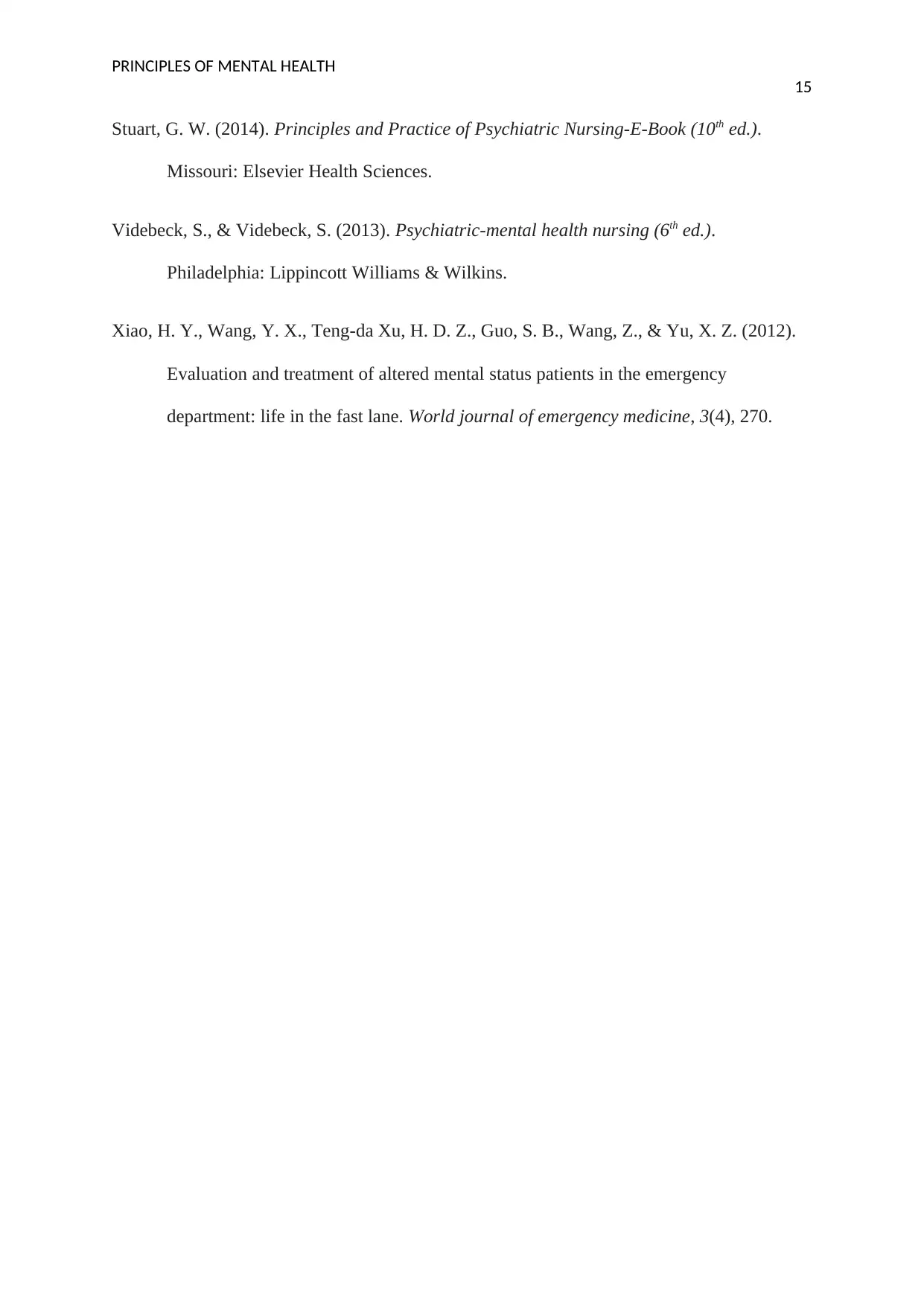
PRINCIPLES OF MENTAL HEALTH
15
Stuart, G. W. (2014). Principles and Practice of Psychiatric Nursing-E-Book (10th ed.).
Missouri: Elsevier Health Sciences.
Videbeck, S., & Videbeck, S. (2013). Psychiatric-mental health nursing (6th ed.).
Philadelphia: Lippincott Williams & Wilkins.
Xiao, H. Y., Wang, Y. X., Teng-da Xu, H. D. Z., Guo, S. B., Wang, Z., & Yu, X. Z. (2012).
Evaluation and treatment of altered mental status patients in the emergency
department: life in the fast lane. World journal of emergency medicine, 3(4), 270.
15
Stuart, G. W. (2014). Principles and Practice of Psychiatric Nursing-E-Book (10th ed.).
Missouri: Elsevier Health Sciences.
Videbeck, S., & Videbeck, S. (2013). Psychiatric-mental health nursing (6th ed.).
Philadelphia: Lippincott Williams & Wilkins.
Xiao, H. Y., Wang, Y. X., Teng-da Xu, H. D. Z., Guo, S. B., Wang, Z., & Yu, X. Z. (2012).
Evaluation and treatment of altered mental status patients in the emergency
department: life in the fast lane. World journal of emergency medicine, 3(4), 270.
1 out of 15
Your All-in-One AI-Powered Toolkit for Academic Success.
+13062052269
info@desklib.com
Available 24*7 on WhatsApp / Email
![[object Object]](/_next/static/media/star-bottom.7253800d.svg)
Unlock your academic potential
© 2024 | Zucol Services PVT LTD | All rights reserved.



